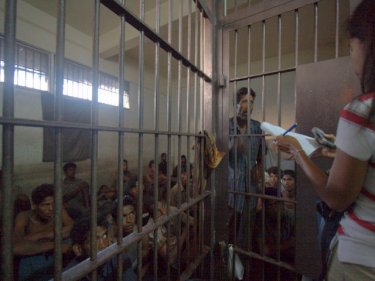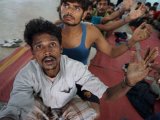The international news agency hired Ms Chutima to open her contact book and arrange interviews for Reuters journalists doing the research that won the 2014 award.
For years Ms Chutima and Australian journalist Alan Morison had led coverage in Asia of the plight of Rohingya in their small on-line news site called Phuketwan that they produced on the Thai resort island of Phuket.
But Reuters has played down Ms Chutima's role in the award-winning series since she and Mr Morison were sued by the Royal Thai Navy for reproducing one paragraph from the Reuters series.
The company that employs 60,000 people world-wide has also distanced itself from the court proceedings that could see Ms Chutima and Mr Morison jailed for up to seven years when a court delivers its verdict in the case on Tuesday.
Reuters did not send a reporter or company representative to the three-day trial in July even though its paragraph was at the centre of the case.
Mr Morison, 67, a former senior editor on The Age, said Reuters has "let the little guys take the rap."
The verdict to be delivered in a Phuket court has ramifications for media freedom and focuses attention on the role of so-called "fixers" and interpreters hired by foreign correspondents, often in conflict and disaster zones.
They are usually local journalists who often receive no credit and little payment for their often dangerous and stressful work and are often left to deal with the ramifications of contentious reporting after correspondents that hired them have flown home.
Mr Morison said by "ignoring our case Reuters has acted like a US marine walking past a mugging."
"Chutima's intimate knowledge of the Rohingya story saved the Reuters journalists years of work," he said.
A Reuters spokesman acknowledged the role that local journalists like Ms Chutima play "in assisting international news organisations like ourselves in accessing information" but claimed her role was limited in preparation of the series.
"As part of writing out story, we asked Chutima to assist in arranging appointments for our journalists as part of our news gathering," the Reuters spokesman said.
"She did not act as a Reuters journalist or stringer and her contribution to the story was limited to arranging these appointments," he said.
The spokesman said Reuters stands by the "fairness and accuracy of our Rohingya coverage, support the principles of a free press everywhere in the world - and the rights of journalists to go about their jobs without fear or hindrance in reporting the truth."
A Royal Thai Navy captain initially filed a criminal complaint against Reuters and two of its journalists over its Rohingya coverage.
But the Navy has not pursued the case against Reuters as Ms Chutima and Mr Morison were left to defend the Reuters paragraph that quoted a people smuggler saying "Thai naval forces" usually earn money for spotting Rohingya boats or turning a blind eye to them.
A key defence argued by Ms Chutima and Mr Morison is that the indictment was erroneously translated from "Thai naval forces" to "Royal Thai Navy.''
They argued there are multiple naval forces in Thailand.
Mr Morison said he doubts he would survive in Thailand's chronically overcrowded jails if he is convicted but decided to stay in Thailand to fight the case with Ms Chutima in the interests of press freedom.
"We remain extremely concerned about the outcome but hopeful that we'll be found not guilty," Mr Morison said.
"Anything less than a not guilty verdict would be bad for freedom of the media both in Thailand and internationally," he said.
Original Fairfax Report
http://www.smh.com.au/world/in-phuketwan-case-reuters-supports-media-freedom--but-from-a-distance-20150831-gjbhx2.html
WATCH the Dateline documentary
The Dateline documentary team from SBS Australia shared the three-day trial of Alan Morison and Chutima Sidasathian with participants for a show full of revealing insights.
http://www.sbs.com.au/news/dateline/story/thailands-moment-truth
Reuters' Response
DATELINE put the following questions to Reuters regarding this story:
1. Is it correct that Reuters has not offered support to Alan Morison and Chutima Sidasathian? If not, why not?
2. Is it correct that Sidasathian assisted Reuters in the investigation for which Reuters was subsequently awarded a Pulitzer Prize in 2014?
3. Has Reuters made any public statement defending the Reuters original report and condemning the fact that journalists are being persecuted for reprinting an extract from that report?
4. Are you aware of any complaint made by the Royal Thai Navy about Reuters's original publication of the article?
David Crundwell, Senior Vice-President of Corporate Affairs at Thomson Reuters, responded with this statement:
''Reuters wholeheartedly supports a free press and the imperative of journalists across the world to publish independent and reliable news, however the case against Phuketwan arose out of aspects of our story being excerpted by Phuketwan from our original and comprehensive story.
As part of writing our story, we asked Chutima to assist in arranging appointments for our journalists as part of our news gathering. She did not act as a Reuters journalist or stringer, and her contribution to the story was limited to arranging these appointments. We appreciate the role that local journalists like Chutima often play in assisting international news organizations like ourselves in accessing information.
Reuters strongly objects to the use of criminal laws anywhere in the world to attempt to punish journalists for the important and valuable work that they do.
On the charges against Reuters, we are aware that a captain in the Royal Thai Navy filed a criminal complaint against Reuters and two Reuters journalists, Stuart Grudgings and Jason Szep, arising out of the Rohingya coverage, and that the complaint alleges violations of the Computer Crimes Act. Based on our understanding, the complaint is under review by the authorities, but we have not been charged. We hope that the Captain and the Navy will reconsider the lawsuit against Reuters in light of the Thai officials' subsequent acknowledgement of the seriousness of the problem, their efforts to combat trafficking, and Reuters' contribution to the authorities having released 900 trafficking refugees from trafficking camps in Thailand.
We stand by the fairness and accuracy of our Rohingya coverage, support the principles of a free press everywhere in the world - and the rights of journalists to go about their jobs without fear or hindrance in reporting the truth.''
WATCH Journey into Hell, by Four Corners
From Burma through Thailand, an award-winning current affairs team traces official complicity in the brutal treatment of the Rohingya and Phuketwan's part in its exposure.
http://www.abc.net.au/4corners/stories/2015/06/22/4257490.htm
WATCH How Trafficking Works
Phuketwan Investigative reporter Chutima Sidasathian says of traficking in 2014: ''It's worse and worse, day by day. Nobody cares''.
http://journeyman.tv/67116/short-films/rohingya-hd.html
LISTEN The Rohingya Solution
A tragedy almost beyond words has been unfolding in Thailand, where a human smuggling network is thriving with the full knowledge of some corrupt law enforcement officers. Alan Morison of Phuketwan talks to Australia's AM program.
http://www.abc.net.au/am/content/2015/s4231108.htm














Very clever line: "Reuters has acted like a US marine walking past a mugging"
I think that line will resonate for quite a while. The witty comments we make in life echo in eternity.("Gladiator" - Russell Crowe)
Cheers
Ian Yarwood
Barrister & Solicitor
Perth, Australia
Posted by Ian Yarwood on August 31, 2015 11:59